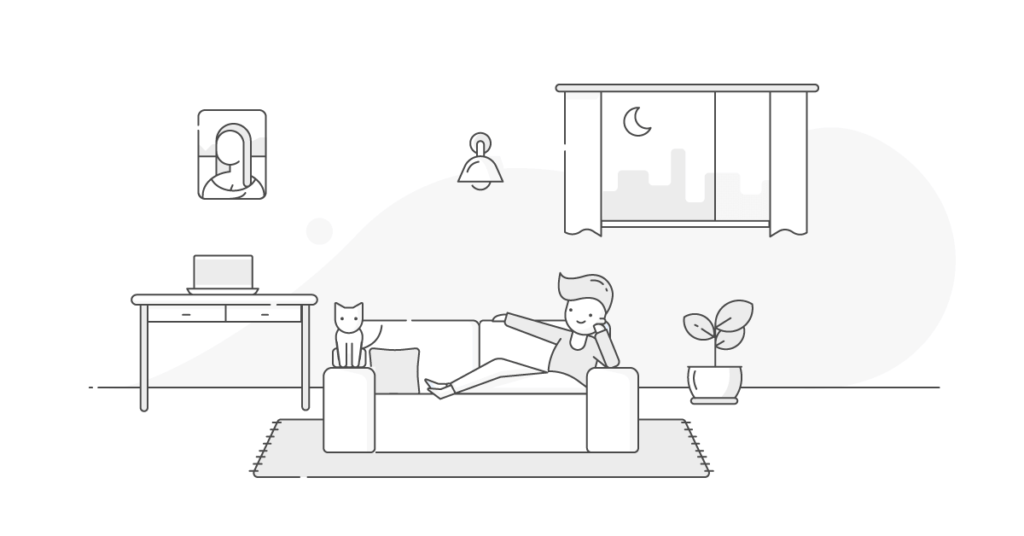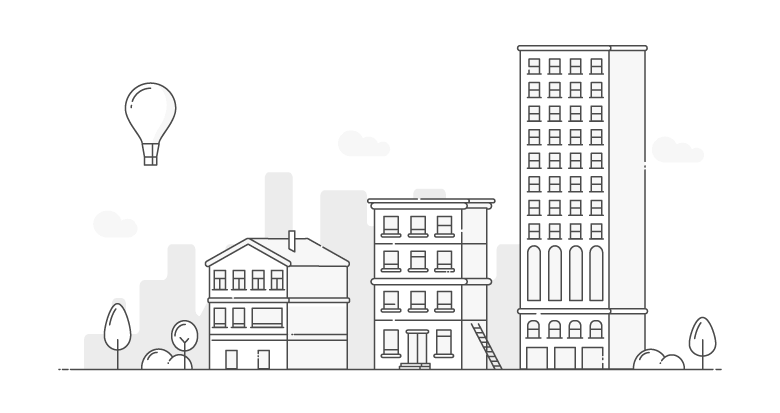Imagine the following: You’ve asked your landlord to do some minor repairs in your rental, which he’s agreed to take care of in the next few days.
When you get home that evening, your apartment lights are switched on. You grab your phone, ready to dial 911 i…until you notice your landlord’s parked car. He’s made use of your spare key, and is now busy fixing your leaky sink.
You’re relieved—no burglars, no dreadful visit from your ex who kept a copy of your apartment keys. But wait a sec, are landlords even allowed to enter your apartment if you’re not home?

Good question. In Germany, several rules and laws exist that protect tenants. But many of us aren’t 100% sure as to when exactly they apply and in which scenarios they… simply don’t.
That’s where we come in—to shed some light on your most pressing questions on German renters’ rights.
- What are your rights as a tenant?
- What are your obligations as a tenant?
- When is your landlord allowed to terminate your lease?
What are your rights as a tenant?
Let’s dive deep into your usual rights as a tenant. However, always make sure to properly consider your individual case, including all its background info (plus, we’re insurers—not lawyers).
Disclaimer: Some of the sources we’re linking out to are only available in German. However, try using the Google translate app for an instant translation.
- The right to live in a habitable apartment
First and foremost, landlords are legally required to provide you with an apartment that you can live in comfortably. In exchange for your monthly rent, you can expect your apartment to be kept in good shape. Landlords have to ensure that your heating works, that the reel of your balcony is safe, and that rainwater can’t leak through your windows.
In case some equipment or appliances that came with the apartment are damaged or stop working ( due to wear and tear, for example), your landlord has to step in. If you can’t open the door to your shower because of a broken hinge, your landlord has to take care of it, or get in touch with someone who can. The same applies to broken appliances, such as your dishwasher or washing machine. If one of them stops working for no apparent reason, it’s not usually your obligation to pay for the repair—if you didn’t damage the item yourself, that is. Generally, it might be good to double-check the lease, though. Some contracts will specify that you have to pay for minor damages (up to €100) yourself (Kleinreparaturklausel).
Listen up: In case some of your stuff gets damaged, by a water leak from a broken pipe, for example (we hope that’ll never happen!), your contents insurance will have your back.
- The right to pay less rent
Don’t get your hopes up—this only applies when you cannot use your apartment space in a way that has been agreed upon in your contract. Examples would be if the apartment right above yours goes through some spontaneous (and very noisy) renovations, or if your bedroom gets infested with mold due to some structural defects in your building. If this is the case, it’s up to you to take initiative and get in touch with your landlord ASAP. As you can imagine, you’ll need to do it the proper German way, and file an official notice of defect.
According to the German Tenants’ Association (Deutscher Mieterbund), you can expect a rent reduction during the period in which you cannot live in e your apartment (if you did not cause the damages yourself, that is).
Here’s an overview of how this could look. Of course, each situation is different, so be sure to take your individual case into account.
- Tenant’s rights around your deposit
Handing over a deposit to your landlord sounds like an obligation rather than a right. However, you should know that you don’t have to pay three months’ rent in one go. You’re allowed to split your deposit into three equal monthly payments. In addition, you’ll only have to hand over your deposit once your lease starts, and not right after signing the contract with your landlord.
Good to know: Your landlord has to put the money that he’s received from you (usually by bank transfer or cash) into a separate bank account and can’t just cash it . The German Tenants’ Association advises you to make sure you receive a receipt of your payment from your landlord. This way, it’s easier to get the deposit back once your lease ends.
Which brings us to the next point: What happens to your deposit once you move out? You can expect to get your money back within three to six months—given that you’ve always paid your rent on time, don’t owe your landlord money, and that you’ve left the apartment in good condition. BTW, if this isn’t the case—for example, if you have accidentally damaged your door frame while moving out, or lost the apartment keys, your liability insurance might have your back. Once your insurer pays for the damage, your landlord will probably call it even, and give you back your deposit.
However, what happens, if your landlord refuses to give back your deposit, even though you’ve fulfilled your part of the deal? Your contents and liability insurer, like Lemonade, won’t be able to help you out here. The same applies to any general issues with your landlord (e.g. if he refuses fixing your heating). You can either get in touch with the German Tenants’ Association or alternatively get yourself some German legal insurance. Talk to your insurer beforehand, and take a close look at the insurance policy to make sure you understand all coverages.
- The right to furnish and decorate your apartment any way you please
Do you feel like plastering your walls with your own art to turn your rental into your real home? Go for it. According to Immowelt, it’s your right to paint your walls and put up some hooks to hang up pictures. Just remember that you’ll have to reverse all changes you’ve made to the apartment once you leave.
- The right to choose your visitors
No one can tell you who you can and can’t welcome into your home. As long as all of you respect the building’s rules (more on that later), you can choose to chill in your place with whomever you please.
Are you thinking of moving in with your significant other and believe that your place would be just perfect for the two of you? Deal. Your landlord has to allow your partner to move in.
If you want to sublet your apartment, it shouldn’t be a problem if your landlord agrees to it. Be sure you’ll discuss it with them before the three exchange students you met at the last bar crawl move in.
- The right to keep pets
Good news for your hamster, Rudi. He’s allowed to cohabitate with you. The same applies to any kinds of small pets such as budgies and rabbits. According to decisions of the Federal Court of Justice (Bundesgerichtshof), you’re allowed to keep small pets in your apartment. Your landlord won’t be able to object—given that they aren’t too noisy. But what happens if your (small) pet causes damages to your rental? This is usually covered by your personal liability insurance (also by Lemonade’s liability insurance!).
BTW, landlords cannot forbid you from keeping dogs or cats in your rental flat. They can only refuse to allow your furry friend to move in if there’s a good reason for it. If there happens to be a paragraph in your lease that’s about how pets aren’t allowed in your flat at all, it’s basically not valid.
Give your rental contract a proper read and talk to your landlord to get everything sorted beforehand—especially, if you’re already a proud pet parent, or if you’re thinking of adopting a furry addition to your family.
- ”Hausrecht” (unfortunately, there’s no real English equivalent, let’s call it ‘right to private space’)
Landlords aren’t allowed to enter your apartment whenever they please—after all, it’s your private space. They are only allowed to enter your home if you’ve agreed to it. Back to the beginning of the post—your landlord’s nighttime fixing session is in violation of your rights as a renter. Even if your landlord has good intentions, they have to respect your privacy.
- The right to stay or leave (Should I stay or should I go…?!)
In most cases, German rental contracts have no set end date. They basically don’t expire, and are formulated in a way that protects the tenant from being kicked out at random (woohoo!!). So, in theory, that means you can basically stay in your rental as long as you please (if you respect your obligations, of course.) If you change your mind and decide to move out, you can leave without disclosing your reasons for leaving to your landlord. You’ll simply have to give your three-months notice—and vacate the flat as agreed upon in the contract.
On the other hand, your landlord will need to come up with a convincing reason to make you move out. More on that later.
Now that we’ve revisited all your rights as a renter, let’s take a look at your obligations.

What are your obligations as a tenant?
Not only landlords have to fulfill their obligations, also as a renter you have certain duties to your landlord.
A quick overview of the typical tenant obligations:
- Pay rent
Starting with the obvious—you’ll have to always pay your rent, and pay it on time— at the beginning of the month. If you don’t, according to the German Civil Code (Bürgerliches Gesetzbuch) your lease gets terminated immediately.
- Comply with your lease’s terms and conditions
It’s best if you just grab the lease and read it once from beginning to end. Ask, ask, ask if anything’s not clear to you—do this before you sign on the dotted line.
- Comply with the building rules
If you live in a building with several rental apartments, you’ll have to follow building rules. For example, they might have rules around noise (Ruhezeiten), how to throw away your trash, or if you need to do your part to help clean the stairwell.
- Heat up your apartment
This sounds a bit strange—but you have to heat your apartment during winter. If you don’t turn on your heat, it can cause mold and burst pipes.
Good to know: You’re also responsible for opening windows and airing out your space, so humidity can’t build up.
- Tell your landlord ASAP if you detect any damages or deficiencies
Did you spot some rainwater seeping through your windows? Not great. Tell your landlord immediately. If you don’t, and humidity or water cause damage to your home, you might have to pay for it yourself.
If you accidentally cause damage to your rental apartment (called ‘Mietsachschaden’), your private liability insurance will likely have you covered. For example, Lemonade covers damage to furnishings and permanent fixtures like sinks and the parquet floor, as well as damages to any impacted neighbors, or third parties. However, this doesn’t apply to glass breakage or damage to your rental due to wear and tear—those things won’t be covered.
- Agree to show your rental to interested parties
If your landlord wants to sell your apartment, you’ll have to set one afternoon a week during which he’ll be allowed to show it. This might go without saying, but they have to agree on a suitable time with you beforehand (and can’t just show up unannounced).
- Do some basic renovations before moving out
Don’t let your landlord talk you into anything that you’re not technically obliged to do. Cosmetic renovations like a simple paint jobs might be your responsibility. Though, doing work to ‘beautify’ the rental does not fall under your obligations.
When is your landlord allowed to terminate your lease?
As mentioned above, one of the (not very surprising) reasons your landlord can terminate your lease is if you decide to stop paying rent. However, there’s another reason your landlord can ask you to move out: if they or their close relatives want to live in the apartment.
Eigenbedarf, or the fancy German term describing this situation. Your landlord will have to send you a formal termination letter. Usually, they will have to keep a three-month notice period. However, if you’ve lived in your apartment for more than five years, the notice period extends to six months.
What happens if the apartment is sold to a third party?
The time has come, your landlord has sold your beloved home to someone else. But what does this mean for you?
Interestingly enough, if ownership of your rental changes, your lease isn’t terminated automatically. How come? Well, the renters’ section of the German Civil Code states something along the lines of ‘purchase doesn’t terminate rent.’
Also, your ‘new landlord’ cannot raise your rent automatically. Increasing the monthly rent is only allowed if it was too low to begin with, and needs to be raised to match the local standard (check here if your rent’s adequate.) Another reason to raise the rent is if the apartment underwent some major renovations, such as the installment of a (shiny) new kitchen during the change in ownership. In this case, the new owner might be able to ask for a higher rent.
But as expected, there’s a loophole—if the new owner wants to live in the apartment themselves, you’ll have to vacate.
What can you do in case your landlord only pretends that he wants to live in your place?
Your landlord might tell you to move out because of ‘Eigenbedarf’, but in fact they simply want to get rid of you (to find a different tenant).
If you want to continue living there, you’ll have to prove that your landlord’s faking it. You’ll have to file a written objection letter (remember, that’s how the Germans like doing things). If you happen to see your apartment listing online, such as on ‘Immoscout’ and Co., that’s usually sufficient evidence to show they’re bluffing.
In such a case, your landlord’s claim isn’t valid, and they might have to pay you for damages.
Before you go
Whether you’re moving into a new flat, or already living in the same den for years, it’s important to understand your rights as a tenant. We hope that this has helped you understand the topic of renters’ rights better. Worse comes to worst, that you’ll be able to use your knowledge.
______
If you still have questions about tenants’ rights, or if you have a specific concern about your rental apartment, contact the tenancy law advice service in your federal state.
Disclaimer: You might have to pay for these services yourself.


